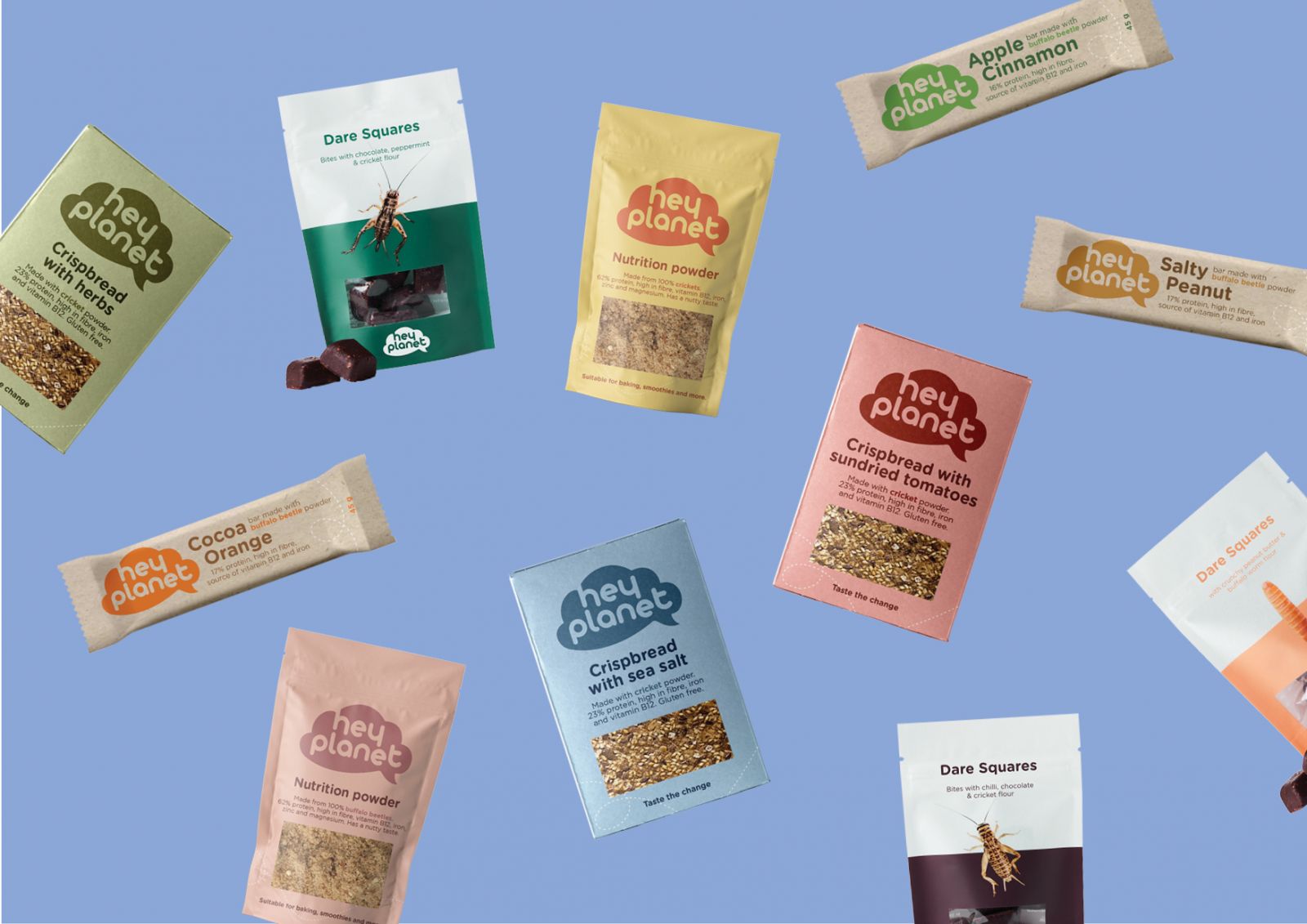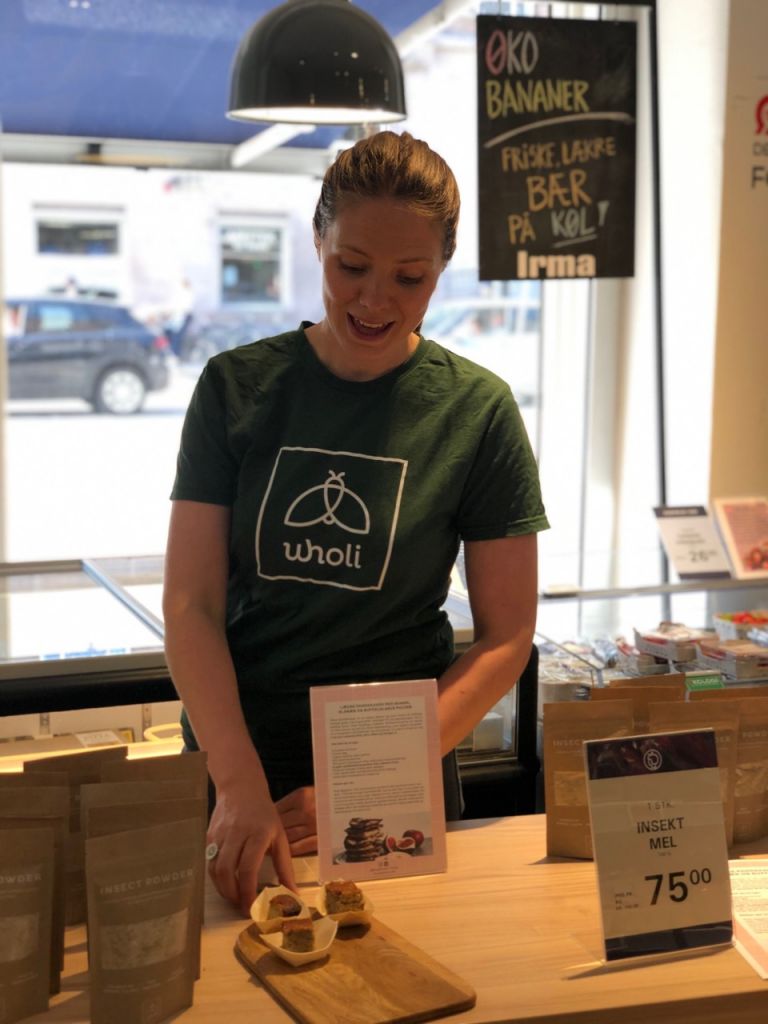Jessica destigmatizes insects: Buffalo worms taste a lot like peanuts

"That’s what our entire business is built upon, integrating insects into normal, everyday products – by integrating them in a way that is not scary to people," says Jessica Buhl-Nielsen. (Photo by Mette Koors)
Hey Planet has turned the ick-factor of eating insects into its X-factor. The CBS alumnus has been seeking to break down the stigmatization of insects since the conception of the start-up comprising of two people, was conceived - no easy feat. Yet, despite of these odds, they have established themselves as pioneers in providing sustainable food for the Danish market – with 35 million insects sold since last year alone.
When presented with the prospect of interviewing Jessica Buhl-Nielsen, it seemed entirely remiss not to try the product first. I tried to keep an open mind, but as I bit hesitantly into my buffalo-worm-based protein bar, I couldn’t help but think about the effect that the stigmatization of insects had on me, leaving me even more curious as to inquire how Jessica Buhl-Nielsen planned to tackle the seemingly herculean task of breaking down this stigma.
With Hey Planet standing at the forefront of the insect food market, would you imagine that insects can begin to play an integral role in the future of Danish cuisine?
Absolutely. That’s what our entire business is built upon, integrating insects into normal, everyday products – by integrating them in a way that is not scary to people.

We spoke about sushi, and how it became more appetizing to Western consumers when it was made inside out. So, by having the rice on the outside and the fish and seaweed in the middle, it didn’t have much to do with sushi essentially. We adopt the same approach in trying to integrate insects by introducing them into foods we already know such as protein bars, snacks, cricket crispbread and our meat replacement product, which is essentially an ordinary burger.
The ambition is for insects to become a part of our everyday diet. We know this will not happen tomorrow, as it definitely takes some years to change the way people think about food.
We are already selling in supermarkets, and many people are already over the stigma. However, getting people to understand the reasoning behind people eating insects will still take a lot of work.
So, realizing the potential of using insects as a vehicle to provide a sustainable resource for the world relies upon breaking down the stigmatization of insects as a foodstuff. It seems it is better to gradually integrate insects in our diets as opposed to serving insects in their unadulterated form. Is this why you use insect flour to make it more palatable for consumers?
Exactly! That is the main reason. Another reason is that it is a bit hard to get fresh, whole insects in Europe. If we could source big juicy grasshoppers, then we would do that more. However, there are few farms in Europe that have these types of insects because the demand isn’t huge. And then you also have to dry them, so they don’t spoil during transportation.
Then it became clear to me that you can actually start something yourself
When they are dried, they are not seen as this huge gastronomic experience because when dried, they are not as flavourful. This is why we use the powder, as the dried insects do not taste as interesting.
Everything we do must be sustainable and also nutritious, but most importantly, it has to taste good. So that’s why we don’t serve whole mealworms with a dash of salt, for example. Not that they taste bad, but they are just not a very interesting experience.
Do various species of insects have specific flavour profiles, and how do you find the right combination of flavours that complement each other in your products?
It starts already with the raw materials. Insects actually taste a bit like what they eat. They are fed with bio waste like pulp from juice or spent grain from beer production. The flavour varies a little according to their feed.
Buffalo worms, which are similar to meal worms, taste very much like peanuts, so we have developed some products to complement that flavour. Whereas, crickets have a lot of umami and are better in baked goods, so we made a crispbread with cricket flour that gives a richer umami flavour and is good with salt.

We also have sweet products with dates and chocolate, which enhance the umami flavour of the crickets. Our peppermint flavour levels out the taste of the crickets, making it taste less strong, actually. We definitely have to take into account what the insects taste like, and we develop the products based on their flavour.
Do you take any measures to ensure sustainability and carbon-friendly production across the supply chain, since these terms are so frequently used as buzzwords today?
Yes. We source all our different ingredients as organic whenever we can, although we cannot source the insects as organic. We don’t actually produce the insects ourselves. A farm in the Netherlands does that. Due to the lack of EU regulation, we are unable to source the insects as organic, however we have decided to take a stance by sourcing all our other ingredients as organic anyway to have a positive impact in this field and add value.
Then there is the whole concern about packaging, which is a really difficult issue, and many people question why we don’t use bio-degradable packaging. This is because it’s not possible to have bio-degradable packaging that also keeps products long lasting and fresh. In order to be sold in supermarkets, they must have expiry dates lasting at least 10 months, which makes the packaging requirements quite stringent.
The solution here lies in appropriately disposing of the packaging and not leaving it on the street, I suppose. However, this is definitely something we are aware of and we aim to optimize our carbon footprint by tracking the entire supply chain and looking at everything we do.
How do you balance the transition of insects into our diets while pursuing a supply chain that is aligned with your values?
In the beginning, we focused more on insects becoming more accepted, which is a big enough task for a 3-person start-up. But we definitely aim to become ‘B certified’ within a few years.
From the beginning, our ambition has been to include the entire supply chain not only within Europe, but also in countries such as Cambodia that have had insects as an integral part of their cuisine for centuries, and have really tasty and juicy insects that are native to their climate. We would like to include them in the global market of edible insects that is going to grow.
However, as we are a small team, we are first focusing on getting Western consumers to accept insects as a food.
If we could source big juicy grasshoppers, then we would do that more
With respect to regulatory barriers, the EU does not acknowledging insects as an organic foodstuff. Are there any other barriers, and once you get through those, do you think the insect food market will take off?
Several EU countries that we are unable to sell to are interested in our products, but we cannot start activities there because of the EU regulation. In short, the problem is the lack of EU regulation. So some countries have a relaxed way of dealing with that and say that if you can prove products are safe, then you can sell there, which is the case in Denmark.
But other countries have said that until EU law is harmonized, it is not allowed e.g. Switzerland, Sweden, and parts of France. With new EU regulation, that should definitely open up more possibilities. It would also open up the opportunity to import crickets from developing countries such as Cambodia, which is not possible right now as not only are they not seen as an organic food, they are not even considered a food. But regulation should help!

As for many other start-ups and self-employed businesspeople, the COVID-19 crisis has also taken its toll on Hey Planet. When the crisis hit, Jessica Buhl-Nielsen and her partners were just about to begin exporting products to Japan and Germany, which, due to closed borders, was put on hold. (Photo by Mette Koors)
It seems that you have really put yourself out there, especially when there’s no regulation or an established market. As a CBS student, what attracted you to the entrepreneurial life, selling insects, as opposed to a conventional consultancy job like many graduates pursue?
That’s a good question. It was essentially a turn of events. I had my first experience of entrepreneurship at CBS while running a little company together with my brother. But at the time, I didn’t think I would be an entrepreneur.
However, when I finished CBS, I studied International Development and Gender Studies, and I was really interested in International Development and how to combine that with Business Studies. That didn’t really become clear to me from my studies, so I decided to go the NGO route like the UN, but I met someone who wanted to start another company working with women in prison in Peru.
By starting something from scratch, it was easier to make an impact and create results very fast
Then it became clearer to me that you can actually start something yourself, and it was a great way of combining business with a charity aspect that is more lasting and sustainable than starting an NGO or becoming a consultant.
By starting something from scratch, it was easier to make an impact and create results very fast.
This is what attracted me to this idea and amazing opportunity to make insects become more accepted, and really change the way we think about something. The green and social aspect of this business idea as a combination really makes sense to me now. Looking for a classic job at a company wasn’t really on the agenda at the time, though now it may be easier to find a job that has a combination of those two elements. I think it was a little more difficult back then.
—
For the uninitiated, myself included, it is not easy to imagine that eating insects will ever become entirely normal. With ever more mouths to feed in the world, and in light of climate change, the reasoning behind eating insects is becoming increasingly evident, however. Yet, while insects may offer us a silver bullet to halt the unsustainable consumption of food in society, the stigma of insects remains a looming obstacle to accepting them in our everyday diets.
But as I bit into my buffalo-worm bar, it dawned on me. It was an anti-climactic realization that insects don’t actually taste bad. On the contrary, they taste pretty good!


































































































































Comments